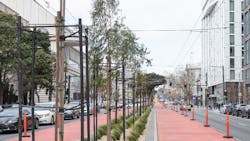SFMTA gears up for start of Van Ness BRT service
The San Francisco Municipal Transportation Agency (SFMTA) will be celebrating the new Van Ness Bus Rapid Transit (BRT) system with a ribbon-cutting ceremony at the War Memorial on April 1.
This immense civic improvement project has not only brought the first BRT corridor to San Francisco, it also presented the opportunity to do much-needed underground and utilities work. This project looks towards San Francisco’s future with an eye towards climate resiliency and transit efficiency
The BRT corridor provides a globally proven solution to improve transit service and address traffic congestion on Van Ness Avenue. With the new, physically-separated transit lanes along the Van Ness corridor, buses will be able to travel without getting caught up in traffic and passengers will be able to board buses more easily. Other benefits include improved lighting, sidewalk extensions (bulb-outs), new countdown signals for people crossing Van Ness and improved accessibility for those with mobility needs.
As great as the street-level improvements are for Van Ness Avenue, the work that has been completed underground is just as important. The construction that has been completed allowed for extensive utility maintenance which included the replacement of sewer pipes and water mains, some that had not been replaced in more than 100 years. This work prepares San Francisco for the next major earthquake and the effects of climate change with stronger infrastructure.
The emergency water supply system dating back to the early 1900s was also part of the overhaul, providing firefighters adequate water pressure and volume throughout the city to fight fires, a hard-learned lesson from the 1906 earthquake and fires. Fires ripped through the city after the 1906 earthquake because the water mains had been severely damaged and there was no water pressure. The emergency water supply system was implemented soon after to prevent history from repeating itself.
